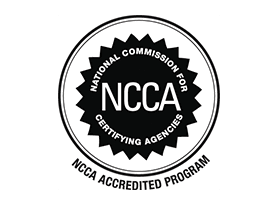The Value of NCCA Accreditation
Español
The Institute for Credentialing Excellence (ICE) offers accreditation to professional certification programs through the National Commission for Certifying Agencies (NCCA).
Accreditation is a process by which a certification program is evaluated against defined standards by a third party. When the certification program is in compliance with these defined standards, it is awarded recognition. That recognition is called accreditation.
In 1977, a Congressional mandate under President Jimmy Carter called for the creation of the National Commission for Health Certifying Agencies (NCHCA). Federally funded by a grant from the Department of Health, Education, and Welfare (now the Department of Health and Human Services), NCHCA was established to develop standards for quality certification programs in the allied health fields and to accredit programs that met those standards.
In 1987, NCHCA was restructured and expanded to include accreditation of certification programs for all professions. As part of the restructure, NCHCA became the National Organization for Competency Assurance (NOCA) under which National Commission for Certifying Agencies (NCCA) was formed. NOCA was structured as a membership association for certification organizations providing technical and educational services concerning certification practices. NCCA was structured as the accreditation body, developing accreditation standards and granting accreditation to certification programs that met these standards.
In 2009, the NOCA Board of Directors moved to change to a new name and became the Institute for Credentialing Excellence (ICE). NCCA’s structure and role remained the same as the certification program accreditation body of ICE.
Accreditation is both a process and a status.
 Accreditation allows certification programs to demonstrate to the profession it represents and to the general public that the program has met stringent standards set by the credentialing profession. Accreditation further enhances a certification program's credibility and legitimacy by providing impartial, third party oversight of a detailed conformity assessment system. Accreditation is more than just a logo that goes on a website. It shows a commitment to quality assurance and continuous quality enhancement for a certification program.
Accreditation allows certification programs to demonstrate to the profession it represents and to the general public that the program has met stringent standards set by the credentialing profession. Accreditation further enhances a certification program's credibility and legitimacy by providing impartial, third party oversight of a detailed conformity assessment system. Accreditation is more than just a logo that goes on a website. It shows a commitment to quality assurance and continuous quality enhancement for a certification program.
